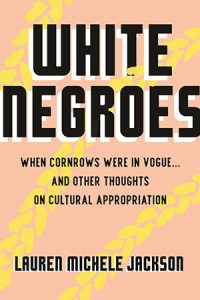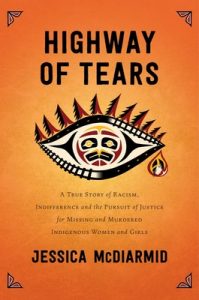Lithub has published their previews for their most anticipated titles for the Fall of 2019 (Adult non-fiction), and so I figured I’d highlight a few of these and offer up some similar titles while we wait for them to be added to our catalogue. All of these titles are on order, so put yourself on hold for them now! Here are a few that caught my eye from all their different lists ranging from Science, Technology, History, Biography, Social Science, Politics, Essay Collections, and Memoir (everything on the Science list sounds A+, especially The Hidden World of the Fox, release date Oct 22):
 White Negroes: When Cornrows Were in Vogue and Other Thoughts on Cultural Appropriation by Lauren Michele Jackson (Beacon Press, Nov 12). My anticipation for this title should come as no surprise if you’ve read any of my previous posts before, but I’m also incredibly interested in this upcoming title because of a fairly recent (beginning of 2019) rupture in the knitting & textiles world when a well known blogger, Karen Templer, wrote a blog post that caused a conversation about race, racism, and representation in the knitting world at large to erupt. This has led to a subsequent apology post, but also to a number of other knitters and crafters speaking up about their experiences and offering up advice for how to be a good ally to BIPOC crafters. One of the posts that has come up, which I’m sure White Negroes on the topic of cultural appropriation will help me to think more critically about, was this one: An Open Letter to White Makers & Designers Who Are Inspired By the Kimono and Japanese Culture by Emi Ito (guest post on Ysolda Teague’s blog). For more on cultural appropriation & more forthcoming titles, see below the cut!
White Negroes: When Cornrows Were in Vogue and Other Thoughts on Cultural Appropriation by Lauren Michele Jackson (Beacon Press, Nov 12). My anticipation for this title should come as no surprise if you’ve read any of my previous posts before, but I’m also incredibly interested in this upcoming title because of a fairly recent (beginning of 2019) rupture in the knitting & textiles world when a well known blogger, Karen Templer, wrote a blog post that caused a conversation about race, racism, and representation in the knitting world at large to erupt. This has led to a subsequent apology post, but also to a number of other knitters and crafters speaking up about their experiences and offering up advice for how to be a good ally to BIPOC crafters. One of the posts that has come up, which I’m sure White Negroes on the topic of cultural appropriation will help me to think more critically about, was this one: An Open Letter to White Makers & Designers Who Are Inspired By the Kimono and Japanese Culture by Emi Ito (guest post on Ysolda Teague’s blog). For more on cultural appropriation & more forthcoming titles, see below the cut!
Here are a few more articles that I came across in trying to better understand cultural appropriation and the line between it and cultural appreciation/exchange:
- Here are two New York Times columnists on What Distinguishes Cultural Exchange from Cultural Appropriation? (Rivka Galchen & Anna Holmes, New York Times). I like the note it ends on: “But what I do know is that underlying the idea of appropriation is the sense that something — or someone — is just there for the taking: A style of dress, a personal narrative, an entire continent. You can’t always prove appropriation. But you usually know it when you see it” (Holmes, emphasis mine).
- This article from Medium is well written, and I can see it going on for about another few paragraphs so it can get into the nitty gritty were it posted in another space: Cultural Appropriation and Cultural Exchange: What’s the Difference? (Uddeshya Delhi) Here are some quotes:
- “What makes cultural exchange different from cultural appropriation is power”
- “Most notable is the power of the privileged to try on and normalize a cultural element of another group, while the group being appropriated from is often demonized and then excluded from participation in their own cultural expressions”
- I enjoyed the video at the end of this article (which is also worth a read): The Difference Between Cultural Appropriation and Appreciation is Tricky. Here’s a Primer. (Julia Brucculieri, Huffington Post)
- Of kimono and cultural appropriation by Shaun O’Dwyer (Opinion piece in the japan times). This one presented an interesting perspective and complicates the issue a bit, I feel.
- The Dos and Don’ts of Cultural Appropriation by Jenni Avins and Quartz (The Atlantic, 2015), which I hesitate to include. It has some points I’d agree with if the author didn’t appear to blur the line so much between appropriation and cultural exchange – I think they could have done better in defining their terms and not confusing the two, for sure. I’m including this article more because I think it has some ideas that need to be better fleshed out, but which I think do present part of the conundrum. It’s trying to be a good guide, but does more to illustrate the confusion around what constitutes cultural appropriation (as compared to appreciation). And as far as the title of this article goes, maybe JUST DON’T.
But I haven’t actually given you any book recommendations to tide you over until White Negroes actually comes out in just under 2 months! Assuming you’ll be able to make your way through a book a month, I’ll give you two titles you might be interested in if White Negroes sounds like your idea of time well spent.
- How to Be Less Stupid About Race by Crystal Fleming – I’ve written about this before, but I think this mention bears repetition. This is a great primer.
- White Fragility by Robin DiAngelo, because I think it might be important while thinking about cultural appropriation to keep white fragility in mind and not immediately leap to defensiveness.
Find some more exciting forthcoming titles below, and some recommendations of what to read, listen, or watch while you’re waiting for them to come out!
 And if we’re talking about racism, let’s also take a closer look at how racism leads to some of the atrocities committed in Canada: Highway of Tears: A True Story of Racism, Indifference, and the Pursuit of Justice for Missing and Murdered Indigenous Women and Girls by Jessica McDiarmid (Atria, Nov 12, on order – click on the book cover or title to get to the item record). If you haven’t heard about the occurrence of missing and murdered indigenous women and girls in Canada, now’s a good time to learn more about this issue, especially given that the final report of the National Inquiry Into Missing and Murdered Indigenous Women and Girls has been released just earlier this year. According to a CBC article:
And if we’re talking about racism, let’s also take a closer look at how racism leads to some of the atrocities committed in Canada: Highway of Tears: A True Story of Racism, Indifference, and the Pursuit of Justice for Missing and Murdered Indigenous Women and Girls by Jessica McDiarmid (Atria, Nov 12, on order – click on the book cover or title to get to the item record). If you haven’t heard about the occurrence of missing and murdered indigenous women and girls in Canada, now’s a good time to learn more about this issue, especially given that the final report of the National Inquiry Into Missing and Murdered Indigenous Women and Girls has been released just earlier this year. According to a CBC article:
The inquiry found that Indigenous women and girls are 12 times more likely to be murdered or to go missing than members of any other demographic group in Canada — and 16 times more likely to be slain or to disappear than white women.
Citing research from Statistics Canada, the inquiry said Indigenous women and girls made up almost 25 per cent of all female homicide victims in this country between 2001 and 2015.
Hopefully that’s enough to sway you to learn more about the issue, and here are a few titles we have in our catalogue to help you do just that:
- Keetsahnak: Our Missing and Murdered Indigenous Sisters (2018)
- Violence Against Indigenous Women: Literature, Activism, Resistance by Allison Hargreaves (2017)
- Stolen Sisters: The Story of Two Missing Girls, Their Families and How Canada Has Failed Indigenous Women by Emmanuelle Walter (2015)
And here are some links to organizations that are dedicated to promoting the well being of Indigenous women, as well as honouring those who are either missing or have been murdered.
- Native Women’s Association of Canada (NWAC), which has published a report
- National Inquiry Into Missing and Murdered Indigenous Women and Girls, with podcasts inspired by the National Inquiry that visits five communities who have experienced loss
- Kairos Canada’s Missing and Murdered Indigenous Women and Girls (MMIWG Info-Hub)
- No More Silence, a community-led database documents the violent deaths of indigenous women, Two-Spirit, and Trans
 Now on a completely different topic (well… perhaps not completely unrelated, as there is a long and deep history of violence conducted in the name of religious belief, but for all intents and purposes, unrelated enough): the history of religion. The Lost Art of Scripture by Karen Armstrong (Knopf, Nov 5) and Dominion: How the Christian Revolution Remade the World by Tom Holland (Basic Books, Oct 29) are two titles to look out for in the coming months.
Now on a completely different topic (well… perhaps not completely unrelated, as there is a long and deep history of violence conducted in the name of religious belief, but for all intents and purposes, unrelated enough): the history of religion. The Lost Art of Scripture by Karen Armstrong (Knopf, Nov 5) and Dominion: How the Christian Revolution Remade the World by Tom Holland (Basic Books, Oct 29) are two titles to look out for in the coming months.
I’ve never read Holland before, but he is also the author of titles such as In the Shadow of the Sword: The Birth of Islam and the Rise of the Global Arab Empire; and Rubicon: The Last Years of the Roman Republic. Dominion has a wide-ranging topic – how Christianity changed the world – that I’m not sure even 624 pages is enough to cover, but it definitely sounds worth a read, if only to make us reconsider our biases and what we take for granted as being universal just because we haven’t considered whence this belief came.
As for Armstrong, she has also authored a number of other titles on the topic of religion, specifically the history of religion, including: Fields of Blood: Religion and the History of Violence; A History of God: The 4000 Year Quest of Judaism, Christianity, and Islam; and The Bible: A Biography, among many other titles. I’ve read Fields of Blood and A Short History of Myth, the former which I remember to be very interesting – arguing that in many cases, what are known as or fought as “religious” wars were actually fueled by mostly secular issues, with religion being used to make the war a moral undertaking; the book encompasses more than just this, though – both to be very well written. In light of the topic of The Lost Art of Scripture, I would probably recommend Fields of Blood, but also probably God Against the Gods by Jonathan Kirsch and The Evolution of God by Robert Wright (available as an e-book from Markham Public Libraries on Overdrive, with whom we now, along with Richmond Hill Public Library, share borrowing privileges!).
And I also just wanted to point out that Karen Armstrong will be visiting Toronto Public Libraries in November (tickets on Eventbrite).
 And speaking of wars, religious and otherwise, there’s the forthcoming The Hundred Years’ War on Palestine: A History of Settler Colonialism and Resistance, 1917-2017 by Rashid Khalidi (Metropolitan Books, Jan 28), told from a Palestinian perspective.
And speaking of wars, religious and otherwise, there’s the forthcoming The Hundred Years’ War on Palestine: A History of Settler Colonialism and Resistance, 1917-2017 by Rashid Khalidi (Metropolitan Books, Jan 28), told from a Palestinian perspective.
Khalidi is a prominent historian of the Middle East, and has written other books, including The Iron Cage: The Story of the Palestinian Struggle for Statehood and Brokers of Deceit: How the US Has Undermined Peace in the Middle East. Khalidi has also published, on the hundred years’ war on Palestine: Historical Landmarks in the Hundred Years’ War on Palestine (2017, also available from Institute for Palestine Studies). Whichever side you stand on, I believe this forthcoming title will be an engrossing read. While you’re waiting for it to come out in 2020, if you haven’t been keeping up to date with news about the Middle East, specifically the Israeli-Palestinian conflict, there are plenty of resources to help you get started, among which a number of books & subject headings to look through from our collection:
- The Israeli-Palestinian Conflict: What Everyone Needs to Know by Dov Waxman (2019)
- The Lions’ Den: Zionism and the Left From Hannah Arendt to Noam Chomsky by Susie Linfield (2019)
- You can also browse through our catalogue according to subject headings:
There is also a wealth of information, both in video format (just look up “Israeli-Palestinian conflict” on Youtube for a number of intros, though I’d also like to just note that you should make a point of figuring out the bias inherent in whoever’s POV you’re learning through) as well as in primers like these below, that you can consult to get yourself started:
- Vox has also published a primer/guide if you’re starting from scratch, which takes you through the whos, whats, whys, wheres and whens: Everything You Need to Know About Israel-Palestine.
- Human Rights Watch World Report 2019: Israel and Palestine Events of 2018
 Last, and this time completely unrelated to the title above, which means no proper segue, User Friendly: How the Hidden Rules of Design Are Changing the Way We Live, Work, and Play by Cliff Kuang and Robert Fabricant (MCD, Nov 12) and Human Compatible: Artificial Intelligence and the Problem of Control by Stuart Russell (Viking, Oct 5) both discuss technology and how it has either influenced the way we conduct ourselves – no duh – but more how making things as user-friendly as possible is changing the world, as well as how the creation of AI should come with a number of considerations, and what those considerations might be.
Last, and this time completely unrelated to the title above, which means no proper segue, User Friendly: How the Hidden Rules of Design Are Changing the Way We Live, Work, and Play by Cliff Kuang and Robert Fabricant (MCD, Nov 12) and Human Compatible: Artificial Intelligence and the Problem of Control by Stuart Russell (Viking, Oct 5) both discuss technology and how it has either influenced the way we conduct ourselves – no duh – but more how making things as user-friendly as possible is changing the world, as well as how the creation of AI should come with a number of considerations, and what those considerations might be.
If you’re interested in reading more about the ways in which technology influences us (beyond the obvious), take a look through some of these titles:
- Hello World: Being Human in the Age of Algorithms by Hannah Fry
- A Human’s Guide to Machine Intelligence: How Algorithms Are Shaping Our Lives and How We Can Stay in Control by Kartik Hosanagar
- New Dark Age: Technology, Knowledge and the End of the Future by James Bridle
- Social Aspects of Artificial Intelligence (subject heading search, sorted by publication date)
And that’s just a shortlist of a few titles I’m interested in! There are so many more that might tickle your fancy – and these are just the nonfiction lists – that I’d urge you to take a look at the full lists on Lithub to see for yourself what other upcoming titles you’re excited about. What release are you anticipating the most for the rest of 2019?
As always, your post is thorough, enlightening, and thought provoking! I’ve bookmarked some of these titles to check up on. I might grab A Short History of Myth, because who doesn’t love mythology? I’ve also been interested in the history of religions lately, particularly how the customs we take for granted came about, so I’d like to read up on that subject matter.
As for my to-read list of upcoming titles, there’s one called Boys & Sex (subtitle: Young Men on Hookups, Love, Porn, Consent, and Navigating the New Masculinity) coming out in January, which is a follow up to Girls & Sex from 2016. Keen to pick that one up. All my other to-reads are fiction, like Ninth House by Leigh Bardugo which I cannot wait for!
I hope you enjoy A Short History of Myth! It was quite different from Armstrong’s usual writing (as gleaned from my reading of her one title, so perhaps not exactly the most accurate statement), but I do remember having fun with it. Yes, it’s always interesting examining something you take for granted and seeing where its roots actually come from. I can’t think of an example off the top of my head (apart from the construction that is Christmas) but I’d be delighted to read about more such instances.
Oh, is that by Peggy Orenstein? I’ve just bookmarked Girls & Sex – now I have a “read by” date, I suppose, so I can follow it up immediately with Boys & Sex. I’ve actually noticed we recently got a few titles to do with masculinity, a couple of which were The Highly Sensitive Man by Tom Falkenstein (I didn’t get far into it though, granted), and Future Man by Tim Samuels (How to Evolve and Thrive in the Age of Trump, Mansplaining, and #MeToo). I haven’t even gotten started looking at upcoming fiction titles yet, thank you for reminding me!
Girl I went into a deep dive last year reading about where all the Christian holidays came from and it truly blew my mind! Christmas, Easter, All Hallow’s Eve/All Soul’s Day……they’re all pagan! And I did know that but learning the details was fun. I especially like how the names were barely changed in some cases (Easter = Ostara, Christmas = Yule).
And yes, I believe it’s by Peggy Orenstein! Interesting that this seems to be a big subject now, but it makes sense with #MeToo blowing up. I’m glad the conversation is being had!